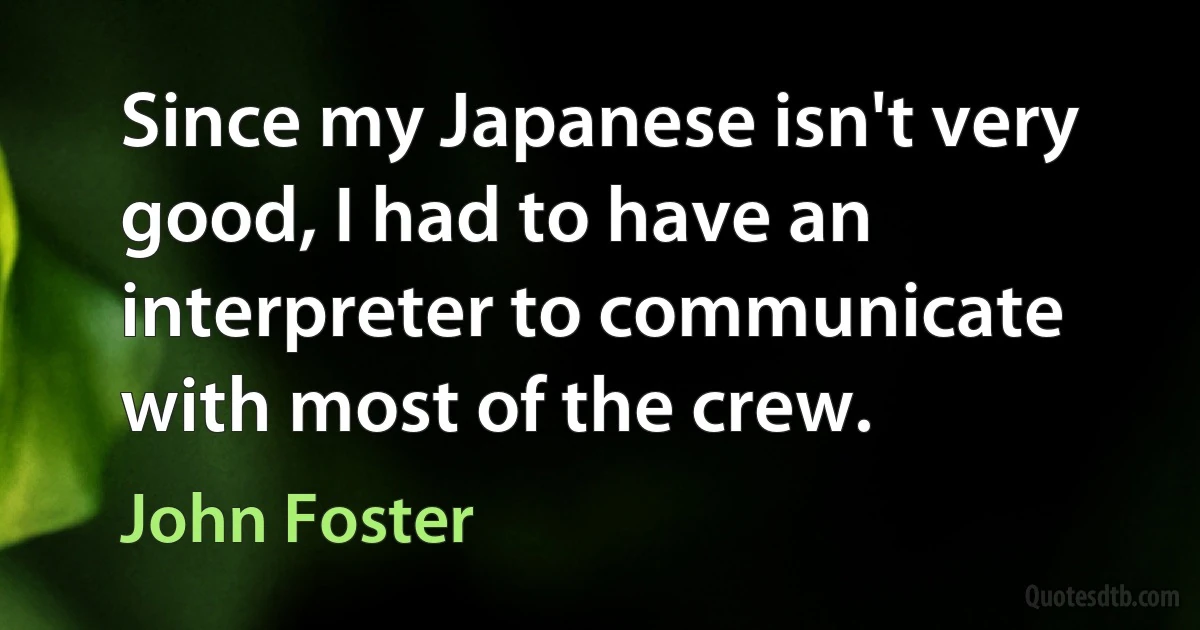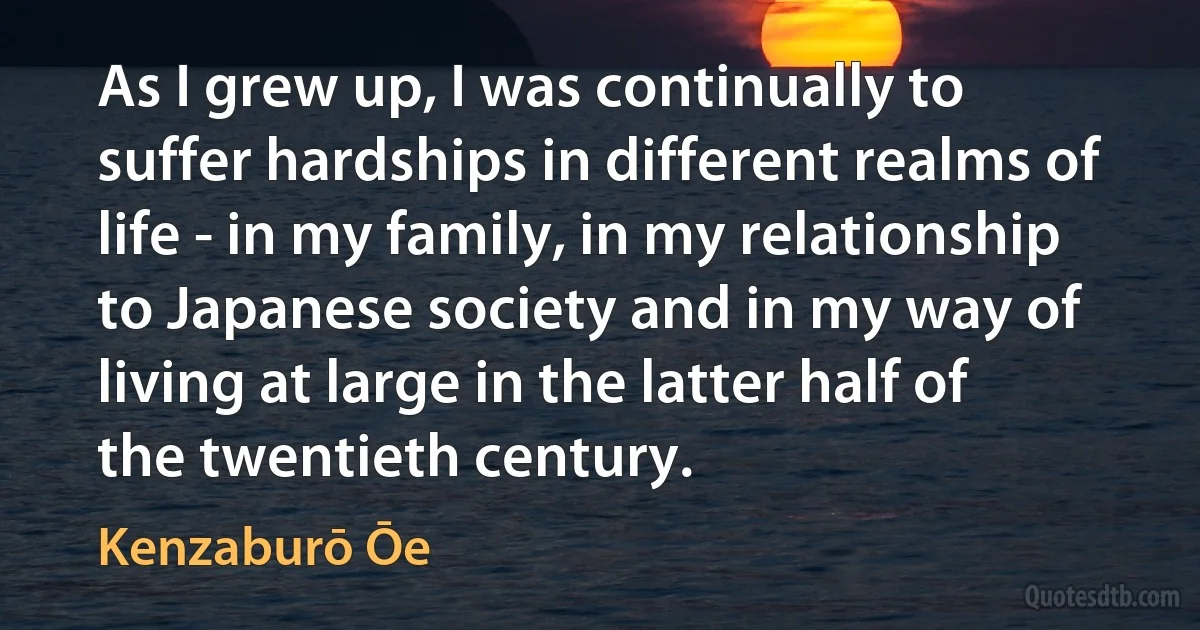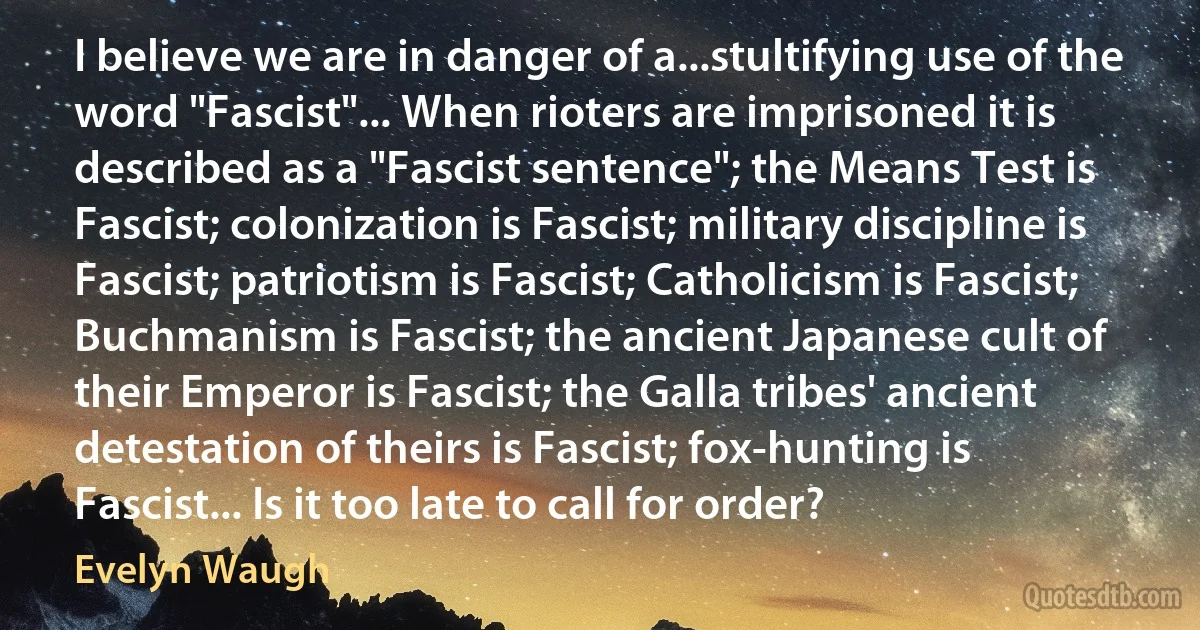Japanese Quotes - page 21
"The surrender and succeeding jubilation was rightly American but, as Admiral Fraser appreciated, Britain and the Commonwealth had now been at war for six long years less a day. If the forenoon had been American, then the evening would be British. The last sunset ceremony had been carried out on the evening of September 2,1939. Since then the White Ensign had flown in every ship by day and night. Admiral Fraser ordered the resumption of sunset routine as from September 2, 1945 and invited all the senior officers of British ships in Tokyo, and a token number of sailors from each, to witness the ceremony in his flagship. He was dissuaded from firing a sunset gun in case some trigger-happy American or Japanese thought the war had re-started.

Louis Le Bailly
The realities of globalization can be seen in something as simple as the investigation of a car crash. If a patrolman investigated a fatal accident in the 1970s, the victims and the witnesses were both likely from the local community; and if the officer climbed into the wreckage, to look for some malfunction in the vehicle, he would probably see from the serial numbers that the car was made in the U.S. He could put all that together, and make his case. But Consider the death of Princess Diana. This accident involved an English citizen, with an Egyptian boyfriend, crashed in a French tunnel, driving a German car with a Dutch engine, driven by a Belgian, who was drunk on Scotch whiskey, followed closely by Italian paparazzi, on Japanese motorcycles, and finally treated with Brazilian medicines by an American doctor. In this case, even leaving aside the fame of the victims, a mere neighborhood canvass would hardly have completed the forensic picture, as it might have a generation before.

Mark Riebling
The Japanese have a term called Ikigai. Ikigai is the Japanese translation of the French 'raison d'etre' or 'reason for being.' When Plato wrote about government, what Plato said was that the most preferred form of governor was what we know as the true statesman. -- The philosopher king who knows his place and his task. My purpose is to be a builder of new ideas and companies. I live to put new ideas together and advance the conversation. It is my Ikigai. I simply love to do it. There is nothing more exciting to me than helping new ideas spring up out of the ground.

Robert Agresta
As a working Sinologist, each time I look up a word in my Webster's or Kenkyusha's I experience a sharp pang of deprivation. Having slaved over Chinese dictionaries arranged in every imaginable order(by K'ang-hsi radical, left-top radical, bottom-right radical, left-right split, total stroke count, shape of successive stroke, four-corner, three corner, two-corner, Kuei-hsieh, ts'ang-chieh, telegraphic code, rhyme tables, phonetic keys, and so on ad nauseam), I have become deeply envious of specialists in those languages, such as Japanese, Indonesian, Hindi, Persian, Russian, Turkish, Korean, Vietnamese, and so forth, which possess alphabetically arranged dictionaries.

Victor H. Mair
The destination of the soul: this is what I, led on by Nils Holgersson, came to seek in the literature of Western Europe. I fervently hope that my pursuit, as a Japanese, of literature and culture will, in some small measure, repay Western Europe for the light it has shed upon the human condition.

Kenzaburō Ōe
The most dangerous moment of the War, and the one which caused me the greatest alarm, was when the Japanese Fleet was heading for Ceylon and the naval base there. The capture of Ceylon, the consequent control of the Indian Ocean, and the possibility at the same time of a German conquest of Egypt would have closed the ring and the future would have been black.

Winston Churchill
All my work is informed by personal experience. It is the seed to which I apply a transcendent dialogue. The idea for my first bubble machine was rooted in a complex combination of many memories. During the Second World War I was in my sister's arms when I saw a young Filipino guerrilla shot by a Japanese soldier. The young guerrilla ran into our garden. The sight of him lying there dying, red blood bubbles foaming from his mouth, made a strong impression on me. Flying over the Grand Canyon on my first trip to America, visiting a soap factory at the bottom of Notre Dame de la Garde in Marseilles, a visit to a brewery in Edinburgh in Scotland: these left deep impressions as well. My mother cooking "guinataan”, a Philippine dessert made of coconut milk and tropical fruit, and the movement of clouds over Manila Bay near where I was born, inspired me to create a work of art that would express and embody the motion of clouds.

David Medalla
In my opinion there are two seats of war danger. The first is in the Far East, in the zone of Japan. I have in mind the numerous statements made by Japanese military men containing threats against other powers. The second seat is in the zone of Germany. It is hard to say which is the most menacing, but both exist and are active. Compared with these two principal seats of war danger, the Italian-Abyssinian war is an episode. At present, the Far Eastern seat of danger reveals the greatest activity. However, the centre of this danger may shift to Europe. This is indicated, for example, by the interview which Herr Hitler recently gave to a French newspaper. In this interview Hitler seems to have tried to say peaceful things, but he sprinkled his "peacefulness" so plentifully with threats against both France and the Soviet Union that nothing remained of his "peacefulness."

Joseph Stalin
In the early 1940s, as a young teenager, I was utterly appalled by the racist and jingoist hysteria of the anti-Japanese propaganda. The Germans were evil, but treated with some respect: They were, after all, blond Aryan types, just like our imaginary self-image. Japanese were mere vermin, to be crushed like ants.

Noam Chomsky
Greeks, Armenians, Jews, Persians, Chinese and Japanese could be cited as examples of ethnic continuity, since, despite massive cultural changes over the centuries, certain key identifying components-name, language, customs, religious community and territorial association-were broadly maintained and reproduced for millennia.

Anthony D. Smith
My father's Japanese and my mother's half Spanish, half Cuban, but I grew up in a household where we spoke English. I learned about my family in bits and pieces. There are things that still peek out in the telling, like my father's sister will tell me something he neglected. I think you find out about the mysteries of your origins in unexpected ways.

Naomi Iizuka
Western man has progressively accepted the use of violence during the years since the outbreak of the First World War. In that war the Germans began the practice of indiscriminate bombing of civilian populations of British cities. ...The peoples of the Allied world and of neutral countries were shocked and outraged by this evidence of German inhumanity and bestiality... the dropping of bombs on men, women and children sleeping peacefully in their beds in great cities. ...By the year 1945 most people of the United Nations were rejoicing over the winning of the war through the destruction from the air of numerous German and Japanese cities, and were revealing scarcely a qualm of conscience over this unequaled devastation and annihilation. The practice from which they had recoiled in horror less than three decades previously, they were now using with cold premeditation and concentrated skill. And nothing like the havoc they wrought had ever before been seen on this earth.

Kirby Page
Even at school, we were, as I say, we were separated, and...and friends were Japanese. So, yeah, I think I considered myself Japanese more than Japanese American, though we would hear that we, we were citizens of this country, and so we had certain rights and so forth. But the parents were strangers, outsiders, and they had to kind of maneuver with the, the racism and pressure and so that, yeah, I felt more Japanese, I think.

Hiroshi Kashiwagi



